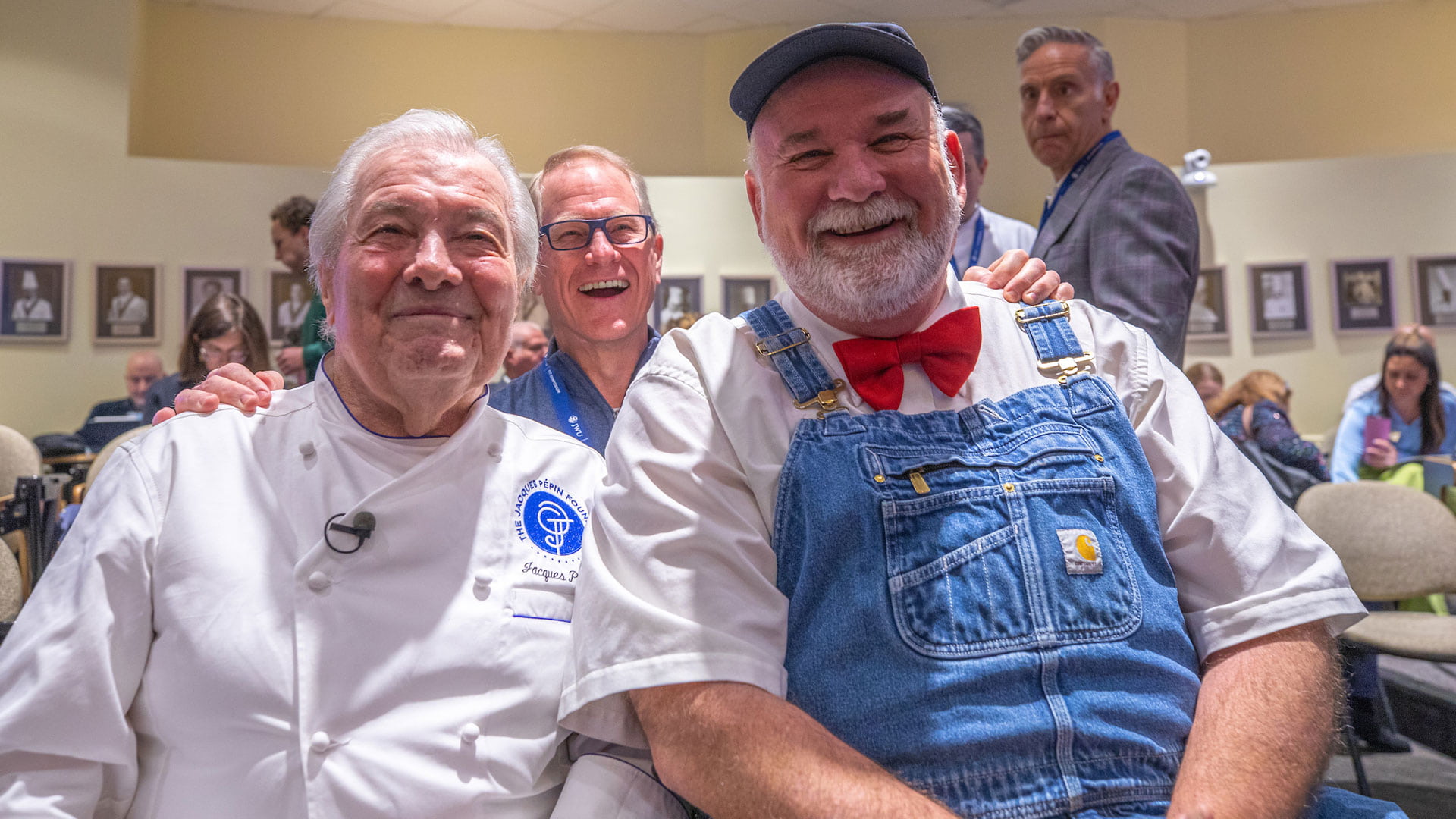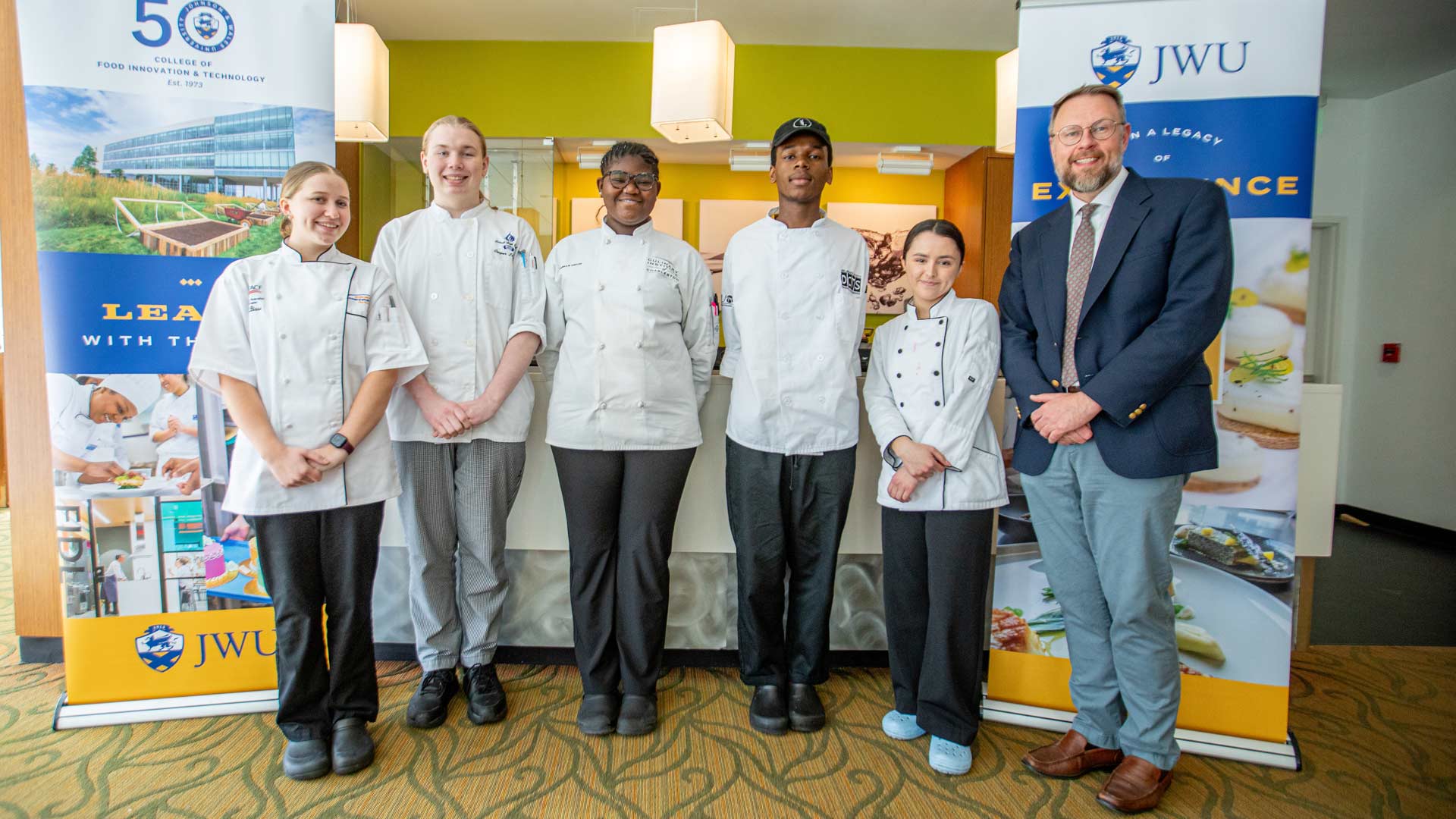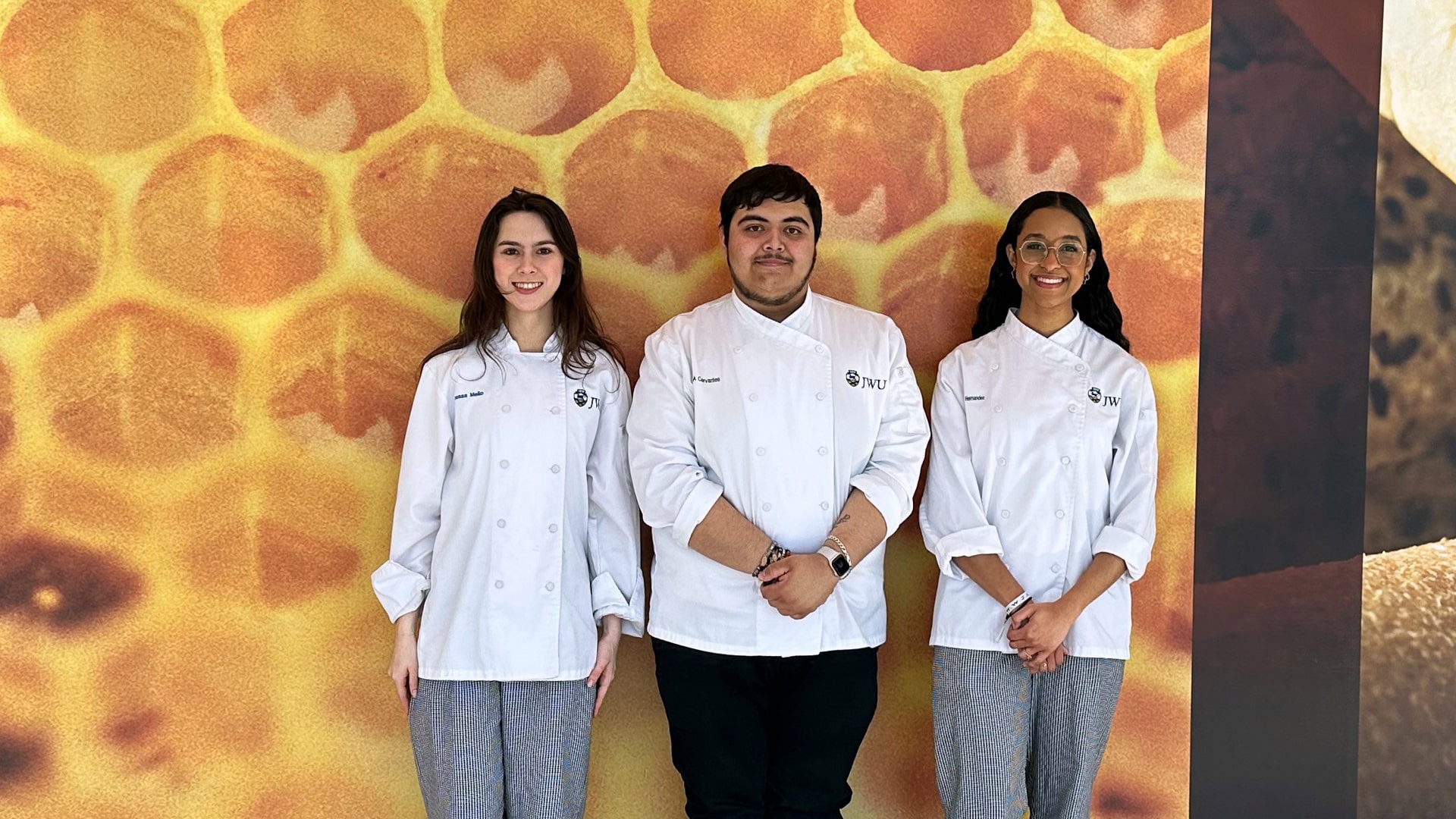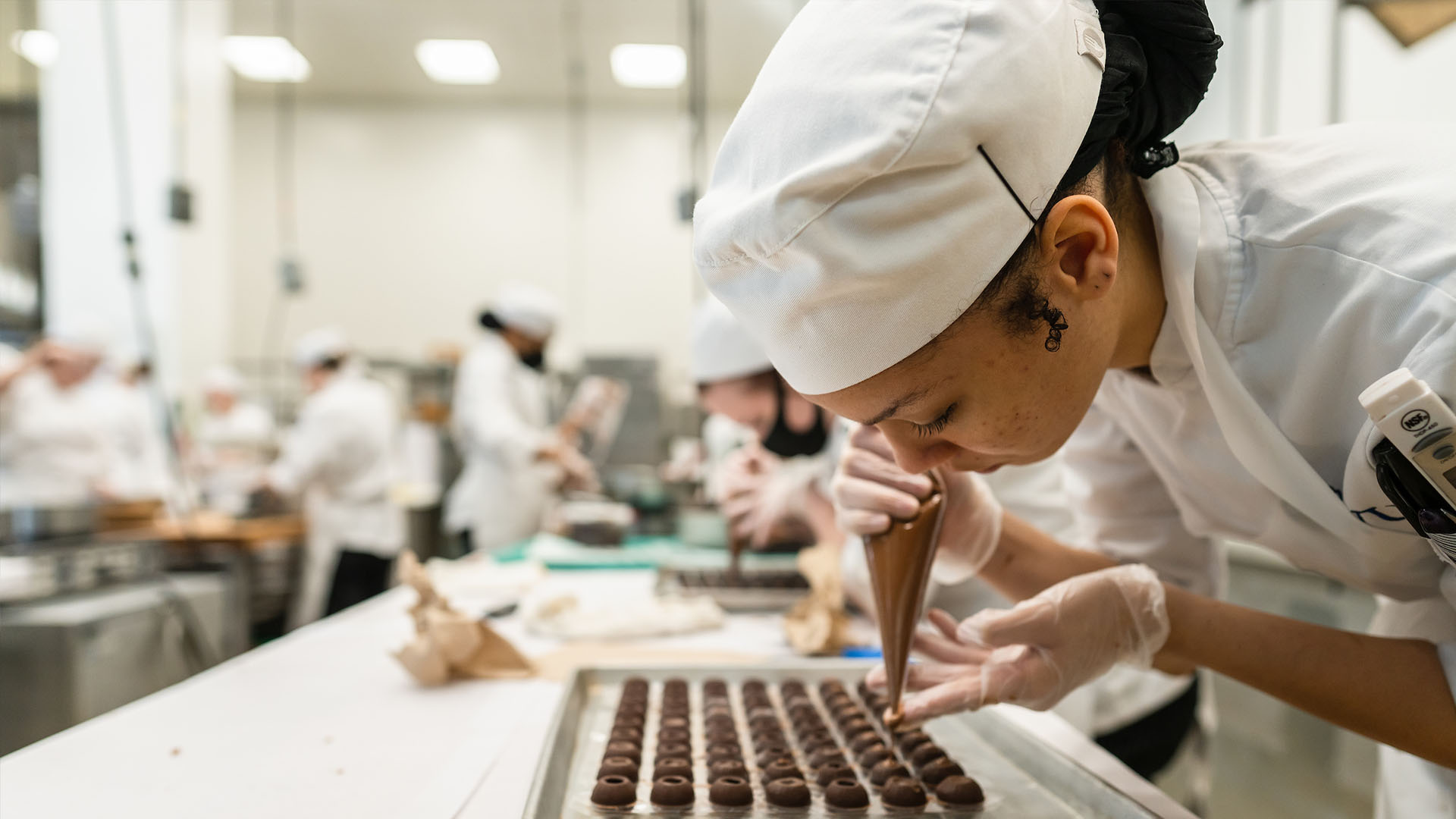Diving Deep into Culinary Sustainability
What does “class” look like for students studying culinary sustainability at Johnson & Wales?
This past Earth Day, Sustainable Food Systems students and Associate Professor Branden Lewis, Ed.D., ’04, ’06 MBA trawled and raked shellfish from Narragansett Bay. For some students who grew up hours from the coast, seeing the sea is a novelty, let alone sailing it.
Local legendary quahogger Jody King was one of their guides. On a good day, he can cram 5,000 of the local clams in a small boat.
Their harvest that day became lunch at sea, while landside lessons included a Save the Bay presentation on how plankton impacts the global food supply and a tour of American Mussel Harvesters that showed how quahog hauls like their own become restaurant-ready.
Trips like this with a hands-on component are standard to the culinary curriculum at JWU, where experiential education rules the roost. But in a world of fast-food delivery, the lessons seem fresh. In fact, they are centuries old: Shellfish farming has been practiced all around the world for that long, and the practice actually helps the environment. The cycle continues at Johnson & Wales University.
Tracing the Roots of Sustainable Culinary Education
Back in 2000, JWU moved to the forefront of culinary innovation among higher education institutions, purposefully designing its curriculum so that students can explore how to be stewards of the world through food. While other colleges may have caught up over the years in providing food system programs that focus on agriculture or conservancy, JWU is the only institution that focuses on sustainable food preparation.
"JWU is the only institution that focuses on sustainable food preparation."
- Branden Lewis, Ed.D., '04, '06 MBA
Culinary education at JWU is also embedded in community. Students build relationships with local farmers and other growers and producers. And the experiences are vast: Unlike a state like Iowa where hands-on experience would result in visiting only cornfields and hog farms, JWU Providence is in the midst of diverse geography—both sea and land, both rural and urban farms. Students learn what’s in season and how to harvest food in its ripest and most nutritious stage with the lowest possible carbon footprint.
But what type of careers await students who major in this area? The Sustainable Food Systems degree can prepare students for meaningful and fulfilling futures in culinary sustainability, policy and advocacy, environmental sustainability, writing for development, supply chain management and public health.
“Students want to help the planet, not use it, and seek ways to contribute to nourishing its inhabitants without diminishing its resources,” Lewis says of scholars pursuing the bachelor’s degree in Sustainable Food Systems, as well as those obtaining degrees in Culinary Nutrition, Culinary Science & Product Development and Dietetics and Applied Nutrition.
“I think we only have so many resources, so I’m most inspired by knowing how to use what we have without being too greedy and wasteful.” — Ellie Pettigrew '24
To this end, JWU culinary students are becoming part of the revolution toward sustainability, helping to fix the planet around them through plant-based cookery, local sourcing, and farm-to-table cuisine.
What It's Like to Earn a JWU Sustainable Food Systems Degree
There are so many reasons why a student may choose to focus their culinary studies around sustainability.
Celia Kinneary '23, earned her associate degree in Baking and Pastry Arts at JWU. Now a junior and president of JWU’s Bee the Change apiary society, she has used JWU’s Design Your Own Major program option to create a Sustainable Baking major. She’s inspired to be a part of sustainable practices rather than helping to inadvertently destroy the environment. Multiple trips to dairy and organic farms (she worked on one too) during her studies at JWU exposes her to different perspectives and learning practices.
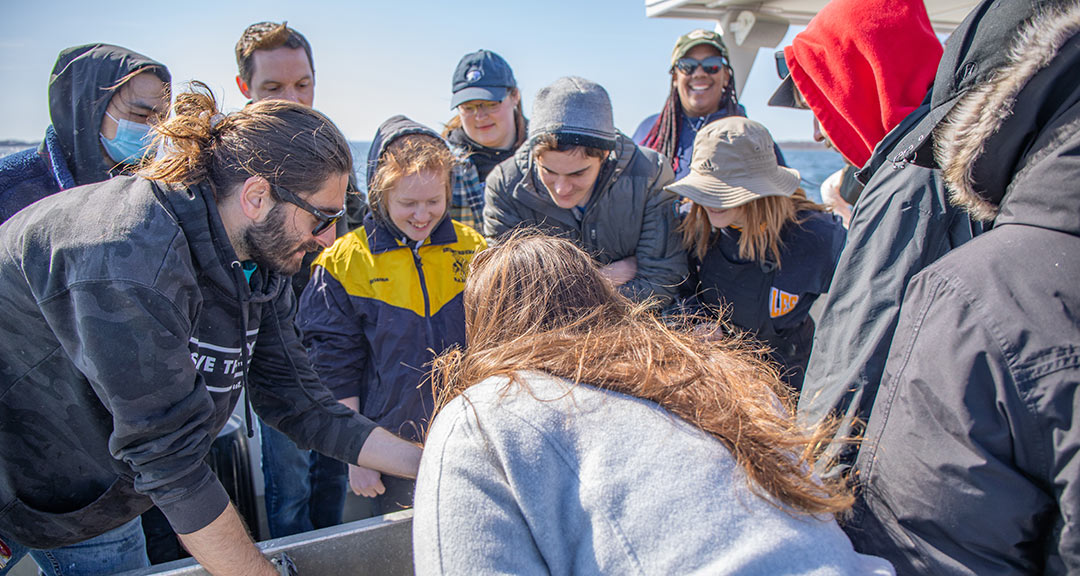
SUSTAINABLE FOOD SYSTEM STUDENTS LEARNING ON THE OCEAN ON EARTH DAY 2022
Ellie Pettigrew ’24 is majoring in Sustainable Food Systems and minoring in Public Health. She grew up in Connecticut where she spent summers clamming with her family, including her Coast Guard father. “I think we only have so many resources, so I’m most inspired by knowing how to use what we have without being too greedy and wasteful.”
Brianna Pinder ’24 had been working on an associate degree in Culinary Arts, but she decided she wanted to be more specialized, so she is double majoring with a bachelor’s in Sustainable Food Systems. “Culinary sustainability is very upcoming in the industry and very necessary,” she says. “The program is focusing more on the environment, and it’s important for farms and other businesses to include sustainability in their processes and to understand the food system as a whole. People don’t have a picture of the whole food system, and this major helps them understand.”
“Culinary sustainability is very upcoming in the industry and very necessary...People don’t have a picture of the whole food system, and this major helps them understand.” — Brianna Pinder '24
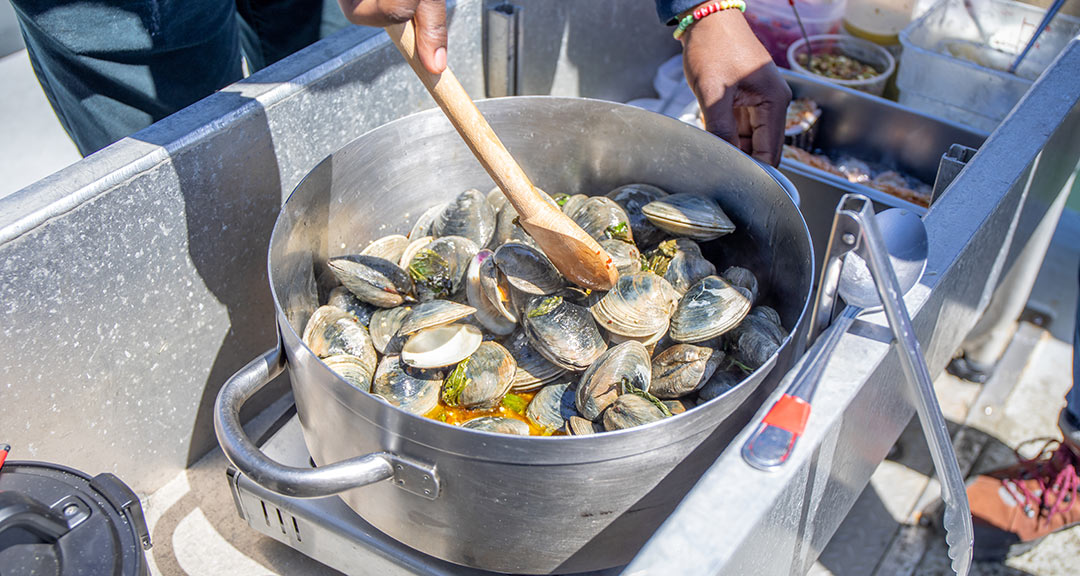
JWU SUSTAINABLE FOOD SYSTEMS STUDENTS MAKE LUNCH FROM QUAHOGS THEY JUST LEARNED TO HARVEST
Other students choose to minor in this field to pursue their passions. “After realizing that food was one of my greatest passions in this world, I decided that minoring in sustainability is an obvious option,” says Zach Curry ’23, a Food and Beverage Entrepreneurship major. “There is something about cooking in nature that has always intrigued me.” Growing up in Massachusetts, Curry was always a short walk from a local forest or harbor. “This led me to have a deep appreciation for our natural environment, and after learning about climate change and the destruction of natural environments around the world as a kid, I always knew I needed to play my part.”
No matter the reason, at JWU you can put your passion for sustainability into action. Here’s what the full degree program looks like.
Year 1
Students begin their professional culinary training in their first year, honing skills and techniques while studying foundations such as environmental science, food safety and sanitation management, and nutrition.
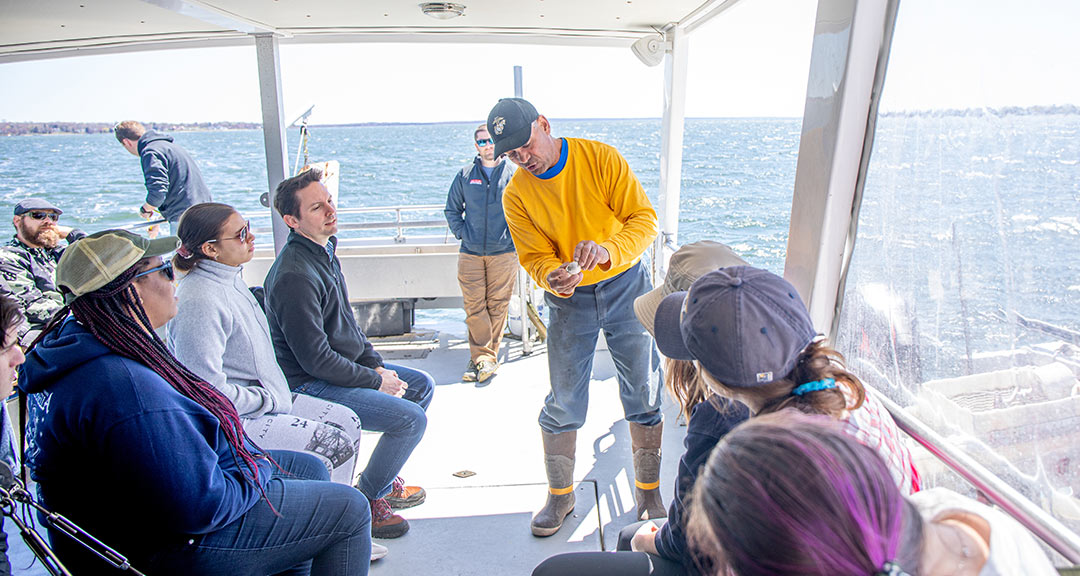
QUAHOGGER JODY KING TEACHES JWU SUSTAINABLE FOOD SYSTEMS STUDENTS ALL ABOUT QUAHOGS
Year 2
The second year focuses on understanding how to cook with the community, working with what farms are pulling out of the ground rather than demanding ingredients that may not be locally or sustainably sourced. Students also learn to solve real-world problems in kitchens using case studies, building a critical perspective for food discernment and teaching sensory analysis to build a better chef. Courses vary from showing students how to cook directly from the local farmstand to teaching them to grow food for the menu. Others are designed for students to research diaspora cuisines around the world so they can identify and interview a food leader in a culture, develop a menu with that person that the whole class cooks and invite the food leader to class to better learn the value of their culture and uplift their voices.
Year 3
This year customizes the JWU journey for sustainable food systems students, helping them produce a vision for becoming a food system leader. Culinary expeditions allow students to cook outside under the stars and in different environments. They meet with local purveyors of seafood such as Harvey and Sue of Bluff Hill Cove Oyster Company to discuss catching methods, species and seasonality, aquaculture, quality identification and more. “It can be a challenge for pastry students to work hands-on with fish and shellfish,” says Lewis, “But I’m proud that Wildcats tend to step out of their comfort zones while learning about other food systems!”
Student electives in Year 3 range wildly from conscious cuisine, artisanal farm-to-table desserts, plant-based cuisine, cultivating local food systems, cannabis entrepreneurship, craft brewing, sommelier management, policy and advocacy and more.
"It’s all about connecting to one local environment and having access to clean, sustainable and local food options." — Zach Curry '23
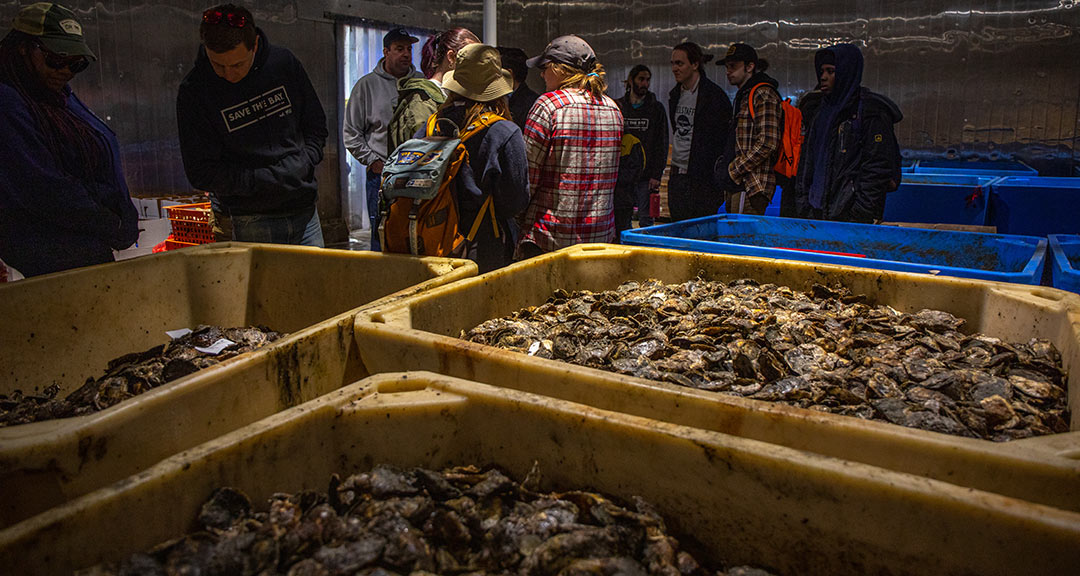
JWU SUSTAINABLE FOOD SYSTEMS STUDENTS TOUR THE AMERICAN MUSSEL HARVESTERS PROCESSING PLANT
Year 4
The final year focuses on the Health and Harvest lab and its food advocacy and sustainability-driven menus as well as the Seminar in Sustainable Food Systems taught by College of Food Innovation and Technology (CFIT) Dean Jason Evans, Ph.D.
Sustainable Food Systems seniors have the option to complete their internship locally or while studying abroad. There’s no end to opportunities, and student internships have ranged from a local lamb farm to Newport Vineyards to Washington, D.C. to Italy.
The True Impact of Studying Culinary Sustainability
It’s true that a college education, at its core, is transformative.
But the experiences for JWU sustainability students are extraordinary. Lewis recounts stories of students seeing a sow give birth to a litter of 10 piglets to actually saving the life of a sheep struggling to birth a lamb during a power outage-inducing thunderstorm, talked through what to do over the phone like a hero pilot in a movie. All this in a program where students can’t so much as boil an egg until they have gathered it from live chickens and washed it, or physically building a sugar shack before preparing a meal inside their new structure.
Perhaps what makes JWU’s program stand out is reflected in the boating trip taken on a cloudless spring day in Narragansett Bay—a net being pulled from the water, creating a ripple effect; students changed by a program, ready to change the world.
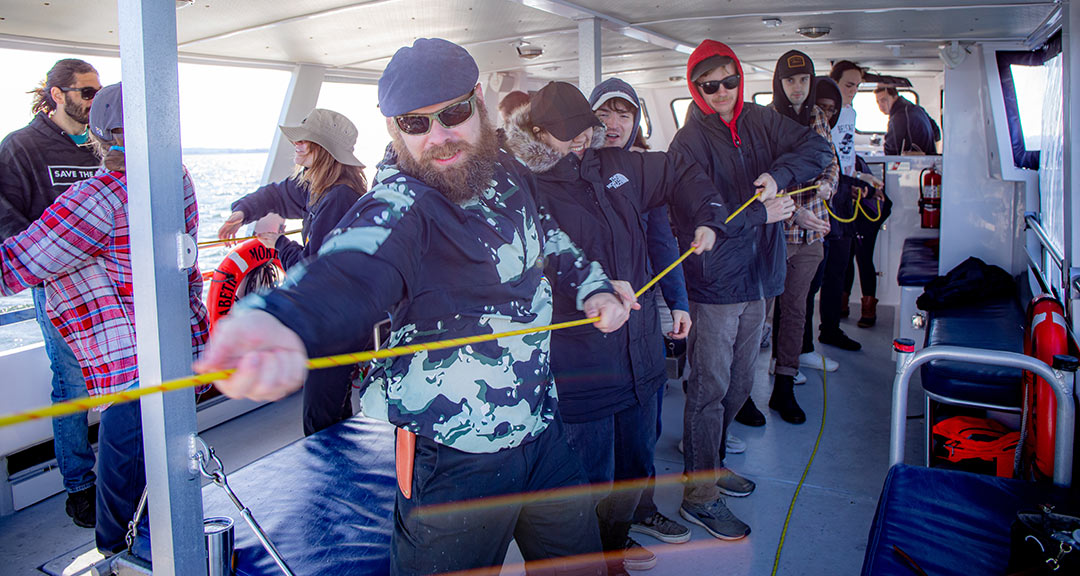
CAN LEARNING GET ANY MORE HANDS-ON THAN WORKING TOGETHER TO PULL A ROPE?
“I’m learning about all these negative impacts to the food system, and I want to help make positive impacts, in whatever shape that takes,” Kinneary says.
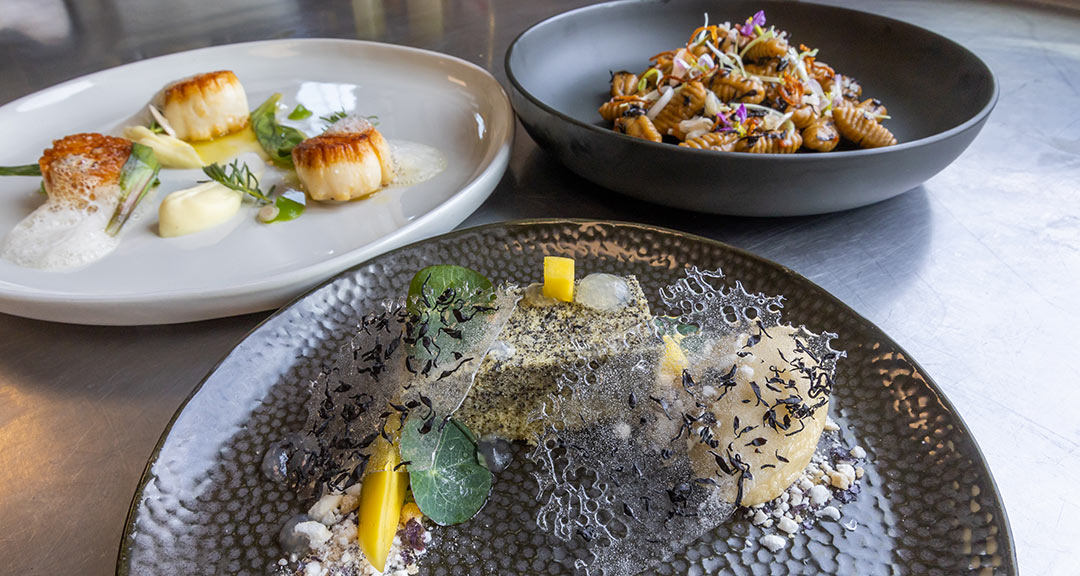
A SUSTAINABLE MEAL PREPARED BY CHEF LEWIS'S SUSTAINABLE CUISINE SPRING 2022 CLASS FOR HUNGRY DINERS
Pinder puts it simply: She found quahogger Jody King’s love for what he does inspiring. “I want to be like that, to do what makes me happy.”
